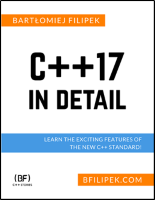Using C++17 Parallel Algorithms for Better Performance--Billy O’Neal
Are you using the parallel capacities of the std?
Using C++17 Parallel Algorithms for Better Performance
by Billy O’Neal
From the article:
C++17 added support for parallel algorithms to the standard library, to help programs take advantage of parallel execution for improved performance. MSVC first added experimental support for some algorithms in 15.5, and the experimental tag was removed in 15.7.
The interface described in the standard for the parallel algorithms doesn’t say exactly how a given workload is to be parallelized. In particular, the interface is intended to express parallelism in a general form that works for heterogeneous machines, allowing SIMD parallelism like that exposed by SSE, AVX, or NEON, vector “lanes” like that exposed in GPU programming models, and traditional threaded parallelism.
Our parallel algorithms implementation currently relies entirely on library support, not on special support from the compiler. This means our implementation will work with any tool currently consuming our standard library, not just MSVC’s compiler. In particular, we test that it works with Clang/LLVM and the version of EDG that powers Intellisense...

